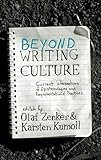Beyond ‹i›Writing Culture‹/i› : Current Intersections of Epistemologies and Representational Practices / ed. by Karsten Kumoll, Olaf Zenker.
Material type: TextPublisher: New York ; Oxford : Berghahn Books, [2010]Copyright date: ©2010Description: 1 online resource (256 p.)Content type:
TextPublisher: New York ; Oxford : Berghahn Books, [2010]Copyright date: ©2010Description: 1 online resource (256 p.)Content type: - 9781845456757
- 9781845458171
- 306.01
- GN307.7
- online - DeGruyter
| Item type | Current library | Call number | URL | Status | Notes | Barcode | |
|---|---|---|---|---|---|---|---|
 eBook
eBook
|
Biblioteca "Angelicum" Pont. Univ. S.Tommaso d'Aquino Nuvola online | online - DeGruyter (Browse shelf(Opens below)) | Online access | Not for loan (Accesso limitato) | Accesso per gli utenti autorizzati / Access for authorized users | (dgr)9781845458171 |
Frontmatter -- Contents -- Preface -- Acknowledgements -- 1. Prologue: Opening Doors Beyond Writing Culture -- 2. Textualization, Mystification and the Power of the Frame -- 3. Reading James Clifford: On Ethnographic Allegory -- 4. Indigenous Research and the Politics of Representation: Notes on the Cultural Theory of Marshall Sahlins -- 5. From the Spirit’s Point of View: Ethnography, Total Truth and Speakership -- 6. Interlogue: ‘Writing Cultures’ and the Quest for Knowledge -- 7. Language Matters: Reflexive Notes on Representing the Irish Language Revival in Catholic West Belfast -- 8. Ethnographic Cognition and Writing Culture -- 9. Hard Truths: Addressing a Crisis in Ethnography -- 10. The Migration of the ‘Culture’ Concept from Anthropology to Sociology at the Fin de siècle -- 11. Epilogue: How Do Paradigm Shifts Work in Anthropology? On the Relationship of Theory and Experience -- Notes on Contributors -- Index
restricted access online access with authorization star
http://purl.org/coar/access_right/c_16ec
Two decades after the publication of Clifford and Marcus’ volume Writing Culture, this collection provides a fresh and diverse reassessment of the debates that this pioneering volume unleashed. At the same time, Beyond Writing Culture moves the debate on by embracing the more fundamental challenge as to how to conceptualise the intricate relationship between epistemology and representational practices rather than maintaining the original narrow focus on textual analysis. It thus offers a thought-provoking tapestry of new ideas relevant for scholars not only concerned with ‘the ethnographic Other’, but with representation in general.
Mode of access: Internet via World Wide Web.
In English.
Description based on online resource; title from PDF title page (publisher's Web site, viewed 25. Jun 2024)


